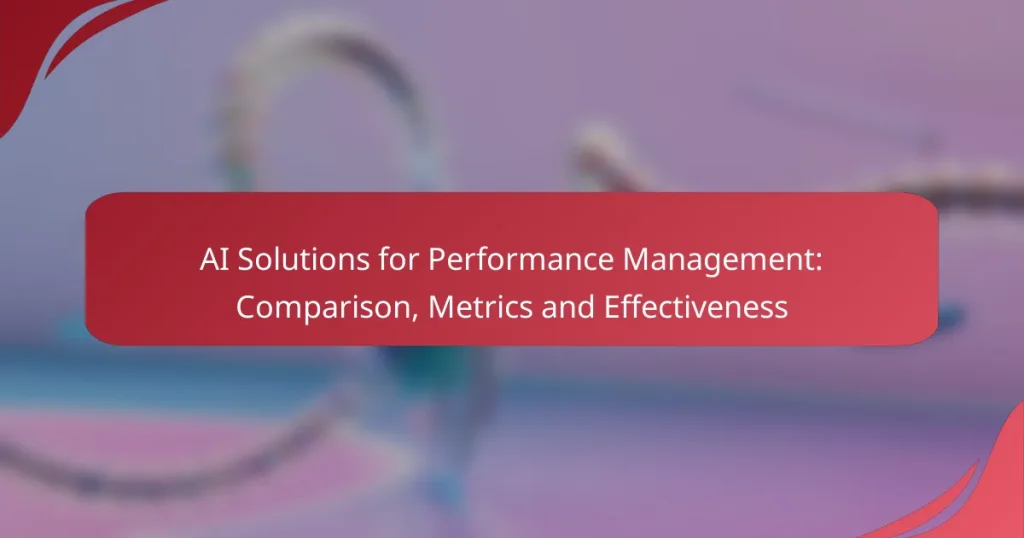AI solutions for performance management are transforming how organizations enhance employee productivity and streamline processes through advanced analytics and machine learning. By automating data analysis and providing real-time feedback, these tools enable informed decision-making and foster employee engagement. Key players in this field, such as Microsoft Azure AI and IBM Watson, offer distinct features that cater to various organizational needs, while effectiveness is measured through metrics like engagement scores and productivity improvements.

What are the best AI solutions for performance management?
The best AI solutions for performance management leverage advanced analytics and machine learning to enhance employee performance, streamline processes, and provide actionable insights. Key players in this space include Microsoft Azure AI, IBM Watson Performance Management, Oracle Cloud AI, Salesforce Einstein Analytics, and Workday Adaptive Planning, each offering unique features and capabilities.
Microsoft Azure AI
Microsoft Azure AI provides a robust platform for performance management through its machine learning and data analytics capabilities. It allows organizations to build custom models that analyze employee performance metrics, identify trends, and predict future outcomes. Azure’s integration with other Microsoft tools enhances collaboration and data sharing across teams.
When using Azure AI, consider leveraging its pre-built models for quick deployment. Organizations should ensure they have a clear data strategy to maximize the effectiveness of their AI solutions. Regularly updating models with new data can improve accuracy and relevance.
IBM Watson Performance Management
IBM Watson Performance Management utilizes AI to deliver insights into employee performance and engagement. Its natural language processing capabilities enable managers to analyze feedback and sentiment from various sources, including surveys and social media. This holistic view helps organizations make informed decisions about talent management.
To effectively implement Watson, companies should focus on integrating it with existing HR systems for seamless data flow. Training staff on interpreting AI-generated insights is crucial to leverage its full potential. Regularly reviewing performance metrics can help adjust strategies as needed.
Oracle Cloud AI
Oracle Cloud AI offers comprehensive tools for performance management, including predictive analytics and workforce modeling. It helps organizations assess employee performance against key performance indicators (KPIs) and align individual goals with business objectives. The platform’s user-friendly interface makes it accessible for managers at all levels.
Organizations should prioritize data quality when using Oracle Cloud AI, as accurate data leads to better insights. Utilizing its customizable dashboards can help track performance metrics effectively. Regular training sessions can enhance user engagement and understanding of the platform’s features.
Salesforce Einstein Analytics
Salesforce Einstein Analytics integrates AI into the Salesforce ecosystem, providing insights into employee performance and customer interactions. Its predictive capabilities help identify high-performing employees and areas needing improvement. The platform’s visualization tools make it easy to communicate insights across the organization.
To maximize the benefits of Einstein Analytics, companies should ensure their Salesforce data is well-organized and up-to-date. Encouraging a data-driven culture can enhance the effectiveness of performance management initiatives. Regularly reviewing analytics can help adjust strategies in real-time.
Workday Adaptive Planning
Workday Adaptive Planning uses AI to enhance workforce planning and performance management. It allows organizations to model various scenarios and assess the impact of different strategies on employee performance. This flexibility enables companies to adapt quickly to changing business environments.
When implementing Workday, organizations should focus on aligning their planning processes with business goals. Utilizing its collaborative features can foster teamwork and improve decision-making. Regular updates and feedback loops can help refine planning models over time.
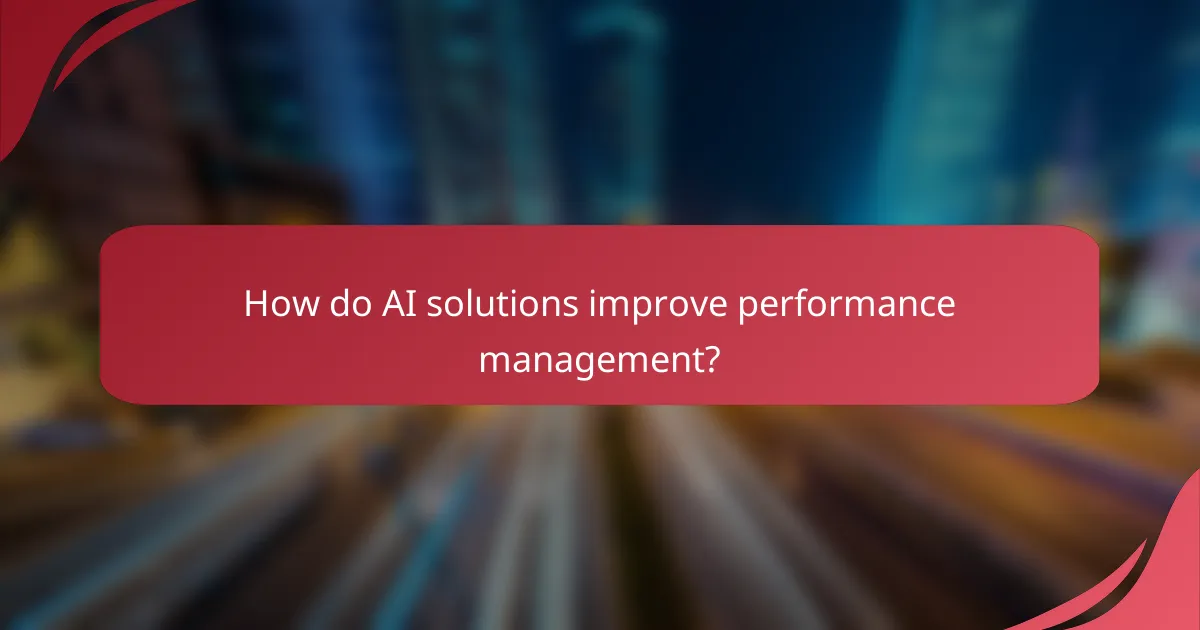
How do AI solutions improve performance management?
AI solutions enhance performance management by automating data analysis, providing real-time feedback, and predicting future performance trends. These capabilities allow organizations to make informed decisions, improve employee engagement, and boost overall productivity.
Enhanced data analysis
AI-driven tools can process vast amounts of data quickly, identifying patterns and insights that may not be visible through traditional methods. By leveraging machine learning algorithms, these solutions can analyze employee performance metrics, project outcomes, and even sentiment analysis from feedback.
For example, an AI system might reveal that certain teams consistently outperform others due to specific training programs or work environments. Organizations can then replicate these successful strategies across the board, leading to improved overall performance.
Real-time feedback mechanisms
AI solutions facilitate real-time feedback by continuously monitoring performance and providing instant insights to employees and managers. This immediate feedback loop helps employees adjust their efforts and improve their performance on the spot.
For instance, an AI tool might notify a sales representative when they are falling short of their targets, allowing them to pivot their strategy before the end of the month. This proactive approach fosters a culture of continuous improvement and accountability.
Predictive performance metrics
AI can forecast future performance by analyzing historical data and identifying trends. Predictive analytics can help organizations anticipate potential challenges and opportunities, allowing for strategic planning and resource allocation.
For example, an AI system might predict that a particular department will experience a drop in productivity based on seasonal trends. By preparing in advance, management can implement support measures to mitigate these declines, ensuring consistent performance throughout the year.
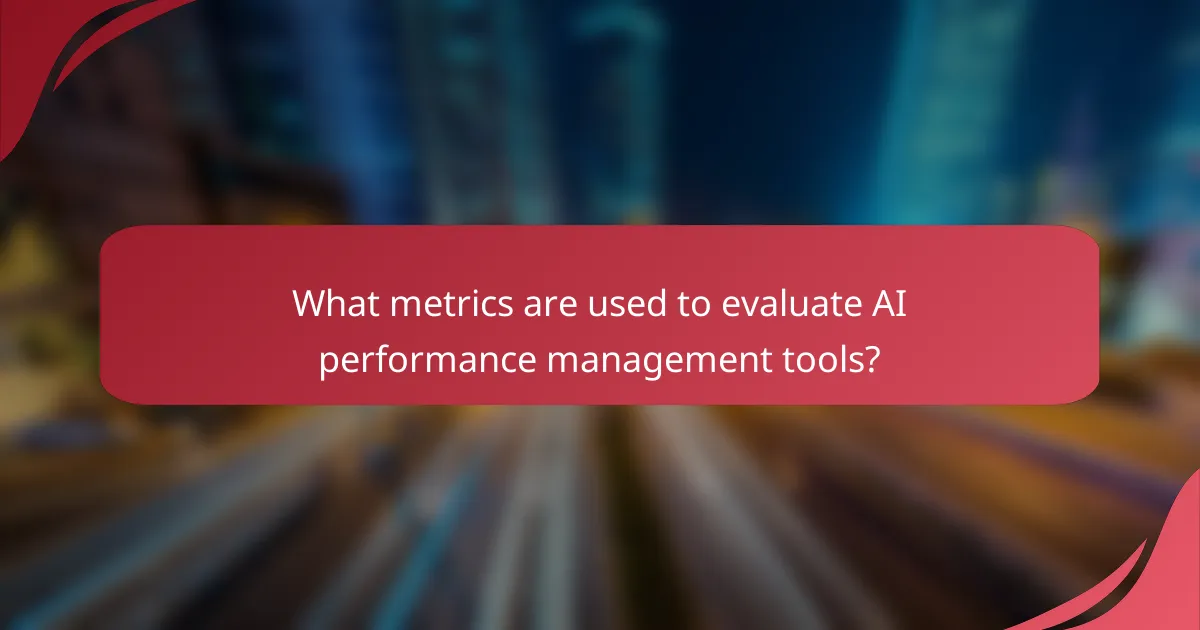
What metrics are used to evaluate AI performance management tools?
AI performance management tools are evaluated using several key metrics that provide insights into their effectiveness. Common metrics include employee engagement scores, productivity improvements, retention rates, and goal achievement tracking.
Employee engagement scores
Employee engagement scores measure how committed and motivated employees are within an organization. These scores can be derived from surveys, feedback tools, and AI-driven analytics that assess employee sentiment and involvement.
High engagement scores often correlate with improved performance and lower turnover. Organizations should aim for scores in the upper range of 70-80% to indicate strong employee commitment.
Productivity improvements
Productivity improvements reflect the efficiency gains achieved through AI tools. This can be measured by analyzing output per employee, time taken to complete tasks, or overall project completion rates.
Effective AI solutions can lead to productivity increases of 10-30%, depending on the industry and implementation. Regularly reviewing these metrics helps organizations identify areas for further optimization.
Retention rates
Retention rates indicate the percentage of employees who remain with the company over a specific period. AI tools can help track and analyze factors contributing to employee turnover, allowing organizations to address issues proactively.
A retention rate above 85% is generally considered healthy. Organizations should leverage AI insights to implement targeted strategies that enhance employee satisfaction and loyalty.
Goal achievement tracking
Goal achievement tracking assesses how well employees meet their performance objectives. AI tools can automate the monitoring of progress towards individual and team goals, providing real-time feedback and support.
Establishing clear, measurable goals and regularly reviewing progress can enhance accountability. Aim for a goal achievement rate of 75% or higher to ensure that employees are consistently meeting expectations.
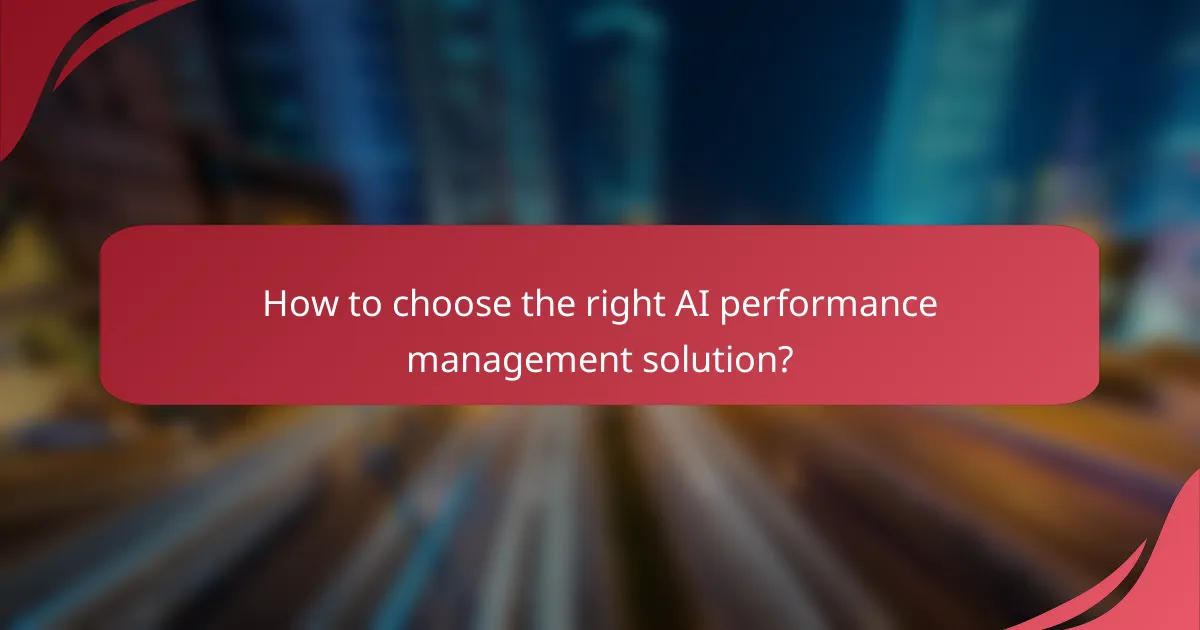
How to choose the right AI performance management solution?
Choosing the right AI performance management solution involves assessing your organization’s specific needs, integration capabilities, scalability options, and cost-effectiveness. Focus on solutions that align with your existing systems and can grow with your business demands.
Integration capabilities
Integration capabilities are crucial when selecting an AI performance management solution. Ensure that the software can seamlessly connect with your current tools, such as HR systems, project management platforms, and communication apps. Look for solutions that offer APIs or pre-built connectors to facilitate smooth data exchange.
Consider the compatibility of the AI solution with your existing infrastructure. For example, if your organization uses Salesforce or Microsoft Teams, prioritize solutions that integrate well with these platforms to avoid disruptions in workflow.
Scalability options
Scalability options determine how well an AI performance management solution can adapt to your organization’s growth. Choose a solution that can handle an increasing number of users and data without compromising performance. This is especially important for businesses anticipating rapid expansion.
Evaluate whether the solution offers tiered pricing or modular features that allow you to scale up as needed. For instance, a solution that provides additional features or user licenses as your team grows can be more cost-effective in the long run.
Cost-effectiveness
Cost-effectiveness is a key factor in selecting an AI performance management solution. Analyze the total cost of ownership, including subscription fees, implementation costs, and ongoing maintenance. Solutions that offer flexible pricing models can help accommodate different budget ranges.
Compare the potential return on investment (ROI) of various solutions by considering the efficiency gains and productivity improvements they promise. A solution that enhances employee performance and reduces administrative overhead can justify a higher upfront cost.
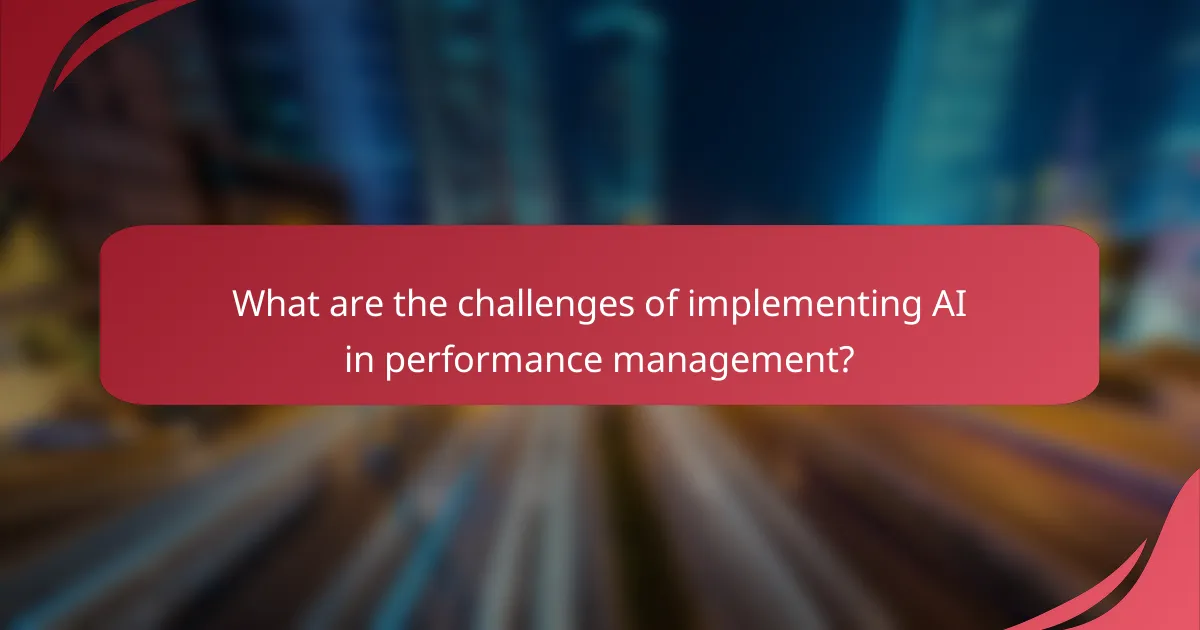
What are the challenges of implementing AI in performance management?
Implementing AI in performance management presents several challenges, including data privacy concerns, integration with existing systems, and the need for accurate metrics. Organizations must navigate these issues to effectively leverage AI for enhancing employee performance and productivity.
Data privacy concerns
Data privacy is a significant challenge when implementing AI in performance management. Organizations must ensure that employee data is collected, stored, and processed in compliance with regulations such as GDPR in Europe or CCPA in California. Failure to adhere to these regulations can result in hefty fines and damage to the company’s reputation.
To mitigate privacy risks, companies should adopt a transparent approach regarding data usage. This includes informing employees about what data is collected, how it will be used, and obtaining their consent. Additionally, implementing robust data security measures is crucial to protect sensitive information from breaches.
Regular audits and assessments of data handling practices can help identify potential vulnerabilities. Organizations should also consider using anonymization techniques to minimize the risk of exposing personally identifiable information while still gaining valuable insights from performance data.
